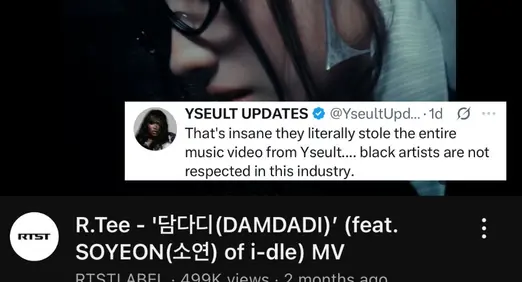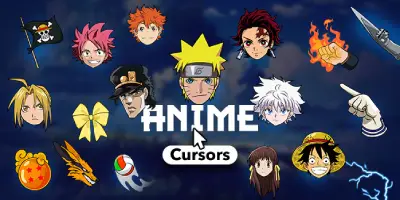Another one, some will say. Yes, again.
But what’s going on this time?
Yseult, an independent French singer known for her hit “Alibi”, a collaboration with Sevdaliza and Pabllo Vittar, has found herself at the center of a heated debate surrounding the song “Damdadi” by Korean songwriter and DJ R.Tee, featuring Soyeon of I-DLE.
It all began on Twitter, when several users pointed out striking similarities between Yseult’s music video “B** YOU COULD NEVER”* and the MV for “Damdadi.”
As more fans began comparing the two side by side, from camera angles and choreography to visual motifs, the discussion quickly snowballed.
That’s insane they literally stole the entire music video from Yseult…. black artists are not respected in this industry.
First clip is « DAMDADI » by R.Tee (feat. Soyeon), we need explication from the director ZANYBROS / HONG MINHO and the label @rtstlabel . This is not… pic.twitter.com/MnbbzmItJL
— YSEULT UPDATES (@YseultUpdates) October 11, 2025
Observers noted that both videos share several nearly identical shots.
Both include a sequence where objects fall in sync with the beat, shelves collapsing, glass shattering, a visual moment that closely mirrors the tone of Yseult’s video.
Even the choreography feels eerily familiar: sharp, contemporary movements contrasting with stillness, framed in wide, symmetrical shots. From lighting choices to color palettes and narrative pacing, the resemblance is difficult to ignore.
Yseult, who remains fully independent and deeply involved in her creative process, took to Twitter and Instagram to defend her work.
Just saw this video “DAMDADI” by R.Tee feat. Soyeon
It’s a straight up copy of my music video “BITCH YOU COULD NEVER.”
Director, label, artists everyone involved the least you could do is have the decency to credit your source.
S/o to my two incredible directors Marita &… pic.twitter.com/pmjWEoUPm5
— Y (@yseultofficiel) October 11, 2025
« BITCH YOU COULD NEVER »
Isn’t just a title, it’s a statement !I’ve built a world that was never meant to be protected .. a world criticized, ignored and pushed aside because being a Black alternative pop woman scares the system.
And now ? I’m watching artists copy my music… pic.twitter.com/crgonHjP9P
— Y (@yseultofficiel) October 12, 2025
Her supporters emphasized that as an independent artist, every aspect, the vision, production, and execution rests entirely on her, calling for both respect and acknowledgment.
That being said y’all don’t understand how HARD it is for Yseult as an independent artist. She put her very own money to produce this music video. One year later it’s stolen by the kpop industry who’s known for copying black culture every chance they gets. It’s frustrating for… pic.twitter.com/lzh8BxSY5h
— YSEULT UPDATES (@YseultUpdates) October 11, 2025
On Twitter, however, the debate quickly spiraled out of control.
Words turned vicious, and hateful personal remarks flooded the feed, transforming what began as an artistic discussion into something far more toxic.
Kpop stans never beating the allegations… actively bullying Yseult for standing up for herself is crazy. Not to mention the racism and sexism of it all. pic.twitter.com/C1NpS6z70e
— nathan 𐚁 ★ (@beylariga) October 12, 2025
Amid the chaos, Soyeon, who only featured on the track, suddenly found herself dragged into the controversy.
Many demanded to hear her side, while her fans insisted she had no involvement in the creative direction, reminding others that she merely lent her voice to the song.
I need Neverland to boost this video. SOYEON said it clearly in the behind-the-scenes “Since I didn’t write this (Damdadi) song, I just follow their direction and match the vibe they’re going for”
SOYEON DID NOT CONTRIBUTE ANYTHING BUT HER VOCAL IN THIS SONG MAKING / cont. pic.twitter.com/FRbJPHxzzo
— 𝓨𝓔𝓗𝓜𝓐𝓩𝓘𝓝𝓖 (@yehmazing) October 11, 2025
Still, that hasn’t been enough to calm the storm of frustrated fans determined to seek justice by any means necessary.
But this situation runs deeper than one MV.
It raises uncomfortable questions about how power, visibility, and artistic credit are distributed in the global music industry.
How many times has this happened before?
How many lesser-known artists have stayed silent, crushed under the injustice of it all?
Do they always get ignored?
Or, seeing a battle already lost, do some no longer bother to fight for their rights?
Is the system itself designed to keep them quiet?
And perhaps, as labels play gods, setting rules, claiming ownership over art and artists alike, we too have become complicit, watching in silence while creativity is traded for control.
Yseult and her fans continue to demand answers.
While the artists involved have yet to break their silence, the director behind the production described the situation as a “misunderstanding”, one he intends to clarify soon, assuring that none of the featured artists were involved in production decisions and that the matter will be handled transparently.
— RTSTLABEL (@rtstlabel) October 13, 2025
The debate hasn’t cooled.
Talking about “inspired” when they literally copied everything frame by frame, you see how disingenuous these people are? And they’ve been seeing Soyeon fan attacking Yseult with racist and fatphobic comments for 3 days now and don’t say anything for it to stop, they’re all evil pic.twitter.com/WY1CeOzd5G
— THE DRAMA‼️ (@BardisDanger) October 13, 2025
This isn’t just about one song.
Plagiarism accusations in music are nothing new. But when an independent, Black, Francophone artist like Yseult raises her voice, the power dynamics feel impossible to ignore.

